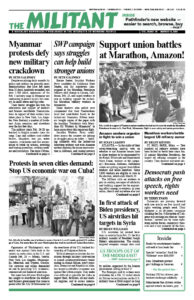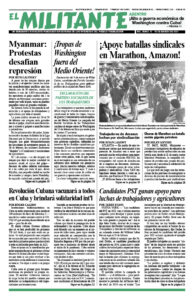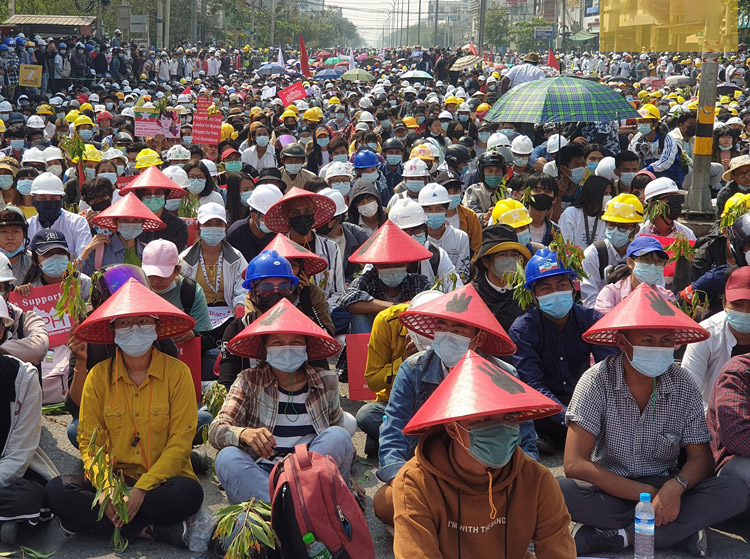Despite escalating daily assaults by police and soldiers on peaceful mass demonstrations that have left more than 30 dead, hundreds wounded, and over 1,500 jailed, opponents of the Feb. 1 military coup in Myanmar are continuing to protest across the country, in small towns and big cities.
Their heroic struggle has won the admiration and support of workers and farmers worldwide. Demonstrations in support of their actions have taken place in New York, Los Angeles, New Zealand, a number of Southeast Asian countries and elsewhere over the last few days.
The military junta Feb. 26-28 unleashed its biggest assaults since the coup. Cops and soldiers used rubber bullets, slingshots, tear gas, water cannons, truncheons and live ammunition to break up actions, arresting and beating protesters, striking workers and journalists. The junta’s Myanmar Radio and Television agency reported that 479 were arrested on Feb. 28 alone.
In the first days of the coup the junta arrested scores of leaders of the National League for Democracy, the bourgeois party that won last November’s elections in a landslide. On Feb. 26 the military announced it had declared 16 labor unions and farmers associations “unlawful.” There are warrants out for the arrest of trade union leaders. Some bosses have been turning the names and addresses of union activists over to the junta.
In Monywa, in the Sagaing region in the north — just across the river from copper mines where thousands of workers went on strike to protest the coup — police and soldiers detonated stun grenades, fired guns and beat protesters Feb. 28. They raided a Buddhist monastery where protesters had taken refuge.
Determination to bring junta down
On March 1, the day after the most killings since the coup began, tens of thousands once again took to the streets across the country, from Myitthar, a small town in the middle of rice paddies and farmland, to Mandalay, the country’s second largest city, where several people have been killed.
Garment and other workers in Yangon, the largest city, are continuing their strikes and protests.
In Dawei, a town in southeastern Myanmar where five were killed Feb. 28, groups of protesters marched through the city March 1 to the applause of bystanders, who gave them the three finger salute of defiance to military rule.
Similar scenes are taking place daily across the country with protesters demanding freedom for political prisoners, reinstating the winners of the November elections and equal treatment for ethnic minorities.
Discrimination and oppression of ethnic minorities has marked the country’s history since the early days of British colonial rule, conquered in a series of bloody wars beginning in 1824.
Gen. Min Aung Hlaing, the head of the military junta, overthrew the National League for Democracy government headed by Aung San Suu Kyi before the new parliament could meet. The generals claim that Suu Kyi’s victory was the result of fraud.
Suu Kyi — the daughter of Aung San, a leader of the fight for independence from Britain — became the symbol of the fight against military rule when she returned to the country in 1988 after years in exile, and began speaking out against then-ruler Gen. Ne Win. A popular rebellion broke out that year but was crushed in blood.
Her popularity grew during the nearly 15 years she spent in detention between 1989 and 2010. Starting in 2010 the military regime began lifting some restrictions on democratic rights leading to parliamentary elections. Still, the military imposed a constitution in 2008 that guaranteed them 25% of the seats, giving them veto power, and permanent control over three of the key government ministries.
Suu Kyi became head of the government in 2016 after her party swept the elections. Despite often tense relations with the top military officials, she became the main public defender of the military’s repression of the Rohingya minority in Rakine province, including the forced expulsion of 700,000 in 2017.
The National League for Democracy government removed additional restrictions on democratic rights, but it also used colonial-era laws to jail journalists who were critical of the government, especially its treatment of ethnic minorities.
Hated overnight guest law
In her first year as head of the government, the hated “overnight guest registration” law was repealed. Under that law anyone who stayed somewhere besides their own home overnight had to register with the government under penalty of fines and arrest.
After the coup the junta reinstated the law, seeking to make it difficult for union and protest leaders to find a safe haven.
Myanmar, known as Burma until 1989, is a country of some 54 million people. Over 60% percent of its people are from the Bamar ethnic group.
Over the last 10 years, as the Myanmar economy opened more to the world capitalist market, the country became a center for world garment production. U.S. corporations, like Gap, as well as companies based in China, Japan and Singapore, set up shop to take advantage of wages that are even lower than in Vietnam and Cambodia. Many of these foreign capitalists formed profitable joint ventures with military-owned corporations, not only in garment, but also in large copper mines, jade production and oil.
At the same time, some 70% of Myanmar’s population live in the countryside, most with no electricity, no running water, no cooking gas. One-third of those living in rural areas are landless peasants.
As the working class in Myanmar grew, so did fights to form unions and struggles for better wages and working conditions. Small farmers have fought moves to take away their farms.
Workers, farmers, and members of all ethnic minorities have joined together in the fight against the military regime. In a March 2 statement, the newly formed General Strike Committee of Nationalities — made up of youth from 27 ethnic groups — declared “its full support” for the Civil Disobedience Movement fighting to oust the junta.


